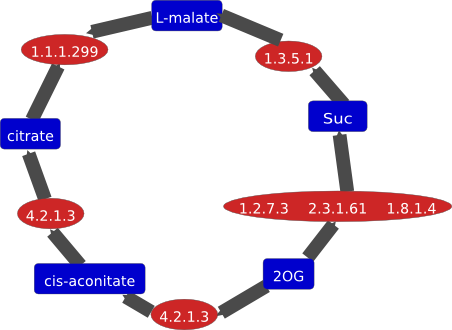EC Number   |
Application   |
Reference   |
|---|
    1.1.1.239 1.1.1.239 | medicine |
distribution of human and rat AKR1C3 is comparable but not identical between the two species. These features warrant future studies of AKR1C3 in both hormone- and non-hormone-associated tissues and identification of the rodent homolog for establishing animal models |
688137 |
    1.1.1.239 1.1.1.239 | medicine |
enzyme is involved in activation of prodrug PR-104A designed to exploit tumor hypoxia. AKR1C3 protein is detected by Western blot in 7 of 23 cell lines and correlates with oxic PR-104A metabolism. AKR1C3 is unable to sensitize cells to 10 other bioreductive prodrugs and is associated with single-agent PR-104 activity across a panel of 9 human tumor xenograft models. Overexpression in two AKR1C3-negative tumor xenograft models strongly enhances PR-104 antitumor activity. Marked upregulation of AKR1C3 is found in a subset including hepatocellular, bladder, renal, gastric, and non-small cell lung carcinoma |
711670 |
    1.1.1.239 1.1.1.239 | medicine |
establishment of MCF-7 cells that stably express AKR1C3 to model its over-expression in breast cancer. AKR1C3 expression increases steroid conversion by MCF-7 cells, leading to a pro-estrogenic state. Estrone is reduced fastest by MCF-7 cells expressing AKR1C3 when compared to other substrates at 0.1�M. MCF-7 cells expressing AKR1C3 cells proliferate three times faster than parental cells in response to estrone and 17�-estradiol. MCF-7 cells expressing AKR1C3 cells also reduce PGD2, limiting its dehydration to form PGJ2 products |
712882 |
    1.1.1.239 1.1.1.239 | medicine |
exposure of HCT-15 cells to cisplatin results in aquisition of cisplatin resistance and concomitant induction of isoform AKR1C3 and aldo-keto reductase AKR1C1 expression. The resistance lowers the sensitivity toward cellular damages evoked by oxidative stress-derived aldehydes, 4-hydroxy-2-nonenal and 4-oxo-2-nonenal that are detoxified by AKR1C1 and AKR1C3. Overexpression of AKR1C1 or AKR1C3 in the parental HCT15 cells mitigates the cytotoxicity of the aldehydes and cisplatin. Knockdown of both AKR1C1 and AKR1C3 in the resistant cells or treatment of the cells with specific inhibitors of the aldo-keto reductases increases the sensitivity to ciplatin toxicity. Pretreatment of the resistant cells with proteasome inhibitor Z-Leu-Leu-Leu-al augments the cisplatin sensitization elicited by aldo-keto reductase inhibitors |
724719 |
    1.1.1.239 1.1.1.239 | medicine |
in patients with cryptorchid testis, AKR1C3 expression occurs in a Tanner stage dependent-fashion. Pre- and peri-pubertal changes appear to promote expression of the enzyme in Leydig cells. In contrast to the normal adult testis, the pediatric cryptorchid testis reveals AKR1C3 expression in Sertoli cells |
713574 |
    1.1.1.239 1.1.1.239 | medicine |
positive isoform AKR1C3 immunoreactivity is extensively present in both adenocarcinoma and squamous cell carcinoma arising from the lung and the gastroesophageal junction. Isoform AKR1C3 immunoreactivity is absent in small cell carcinoma of the lung |
725153 |
    1.1.1.239 1.1.1.239 | medicine |
uniform, diffuse, and strong expression of isoform AKR1C3 in normal endometrial epithelium but not in endometrial stromal cells. The expression of AKR1C3 is reduced in both hyperplastic and carcinomatous endometrial epithelium |
725152 |





